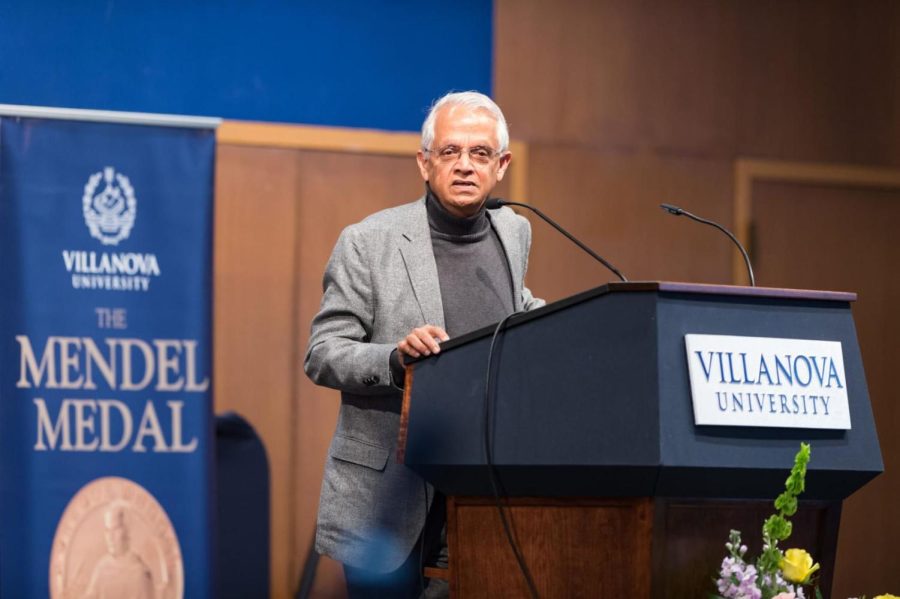Mendel Medal Winner Forecasts Future for Climate Change
November 27, 2018
“One billion people exposed to deadly heat. 600 million to vector born disease. Severe droughts. Food shortages. Mass displacement and mass migration.” If he did not already, Dr. Veerabhadran “Ram” Ramanathan, now had the entire audience’s attention.
Ramanathan explained that this is how he predicts the world will appear in 2050. That is, if people do not take immediate action.
After a two-degree Celsius rise in temperature and the continuation of each individual filling the atmosphere with seven tons of pollutant per year, Ramanathan said everyone on earth in some manner would feel effects like these by 2050 because of climate change.
On Nov. 16, Ramanathan addressed the Villanova community about his research, which earned him the Villanova Mendel Medal.
Ramanathan serves as the distinguished Professor of Climate and Atmospheric Sciences at the Scripps Institution of Oceanography, University of California, San Diego.
Ramanathan was named Champion of the Earth by the United Nations in 2013. In addition, he has received numerous honors and awards, including the Tyler Prize for Environmental Achievement, which is the top environmental prize awarded in the United States, the Volvo Environment Prize and the American Meteorological Society’s Carl-Gustav Rossby Prize.
Dr. Ramanathan earned a B.E. degree from Annamalai University, India (Eng.), an MSc. degree from the Indian Institute of Science, India (Engineering Science) and a PhD from State University of New York at Stony Brook (Planetary Atmospheres).
Light-hearted, quick-witted and impassioned, Ramanathan explained his research in a presentation entitled, “Climate Change: Scientific Basis to Bend the Curve.” He also enumerated on his extensive efforts as a spokesperson and activist for real world applications of his research.
To Ramanathan, solving the issue of climate change is not a job only to be tackled by politicians or only by scientists, but rather, he said, “to solve this problem, which is an existent threat, requires alliance between science, religion, and policy.”
Celebrating its 90th anniversary this year, the Mendel Medal is annually given to an outstanding contemporary scientist in recognition of their accomplishments.
Ramanathan’s most recent work was a discovery of the greenhouse effect on halocarbons, particularly chlorofluorocarbons (CFCs) used in aerosol products.
Another of his recent findings—that the mitigation of short-lived climate pollutants will slow down global warming—resulted in a proposal adopted the United Nations and 30 other countries, forming the Climate and Clean Air Coalition.
Some of Ramanathan’s research focused on his home country of India. One of his publications proved that widespread Atmospheric Brown Clouds over South Asia were causing adverse health and climate effects. He developed an unmanned, aerial vehicle to track air pollution from South and East Asia and North America.
Additionally, in the 1980s, Ramanathan correctly predicted global warming would be detected by 2000. He also worked with NASA’s climate satellite to identify and quantify how radiation field interacts with water vapor and clouds to regulate climate change.
Breaking down his complex research to the crowd at the University, he explained climate change with the metaphor of a blanket. Ramanathan articulated how the accumulation of green-house gases and water vapor thicken this blanket and trap some radiation in the earth’s atmosphere, raising the earth’s temperature.
“Half of this pollution is the wealthiest one billion people,” Ramanathan said. He explained that the monstrous size and scope of hurricanes and fires seen recently in the United States are direct results of this rising temperature.
With many people doubting the studies of climate change scientists, Ramanathan does not claim that his predictions are definite.
“There is a 53% probability we hit the two-degree guardrail by 2050. There is a five percent probability that the change could be much smaller. Then there is a five percent it could be twice as harsh, that is the uncertainty,”Ramanathan said.
But the physicist challenged climate change doubters with a question: “Would you risk you kid’s future that [the climate change] would be low, not high?”
According to Ramanathan’s studies, three billion in poverty contribute to five percent carbon emissions. To address this impact, he teamed up with his two daughters in an initiative called “Project Surya,” which serves as a financing mechanism for communities in India and Nigeria to switch from polluting cookstoves to clean cooking stoves.
In addition to defining the problem of climate change, Ramanathan is also actively part of the solution, mainly through social, political and religious forums.
“Scientists need to take time and reach out to [climate deniers]. My way to reach out is through religion, through churches,” Ramanathan said. “I think Americans need to hear directly from scientists. They don’t trust the media…it’s not what’s wrong with the people, it’s what’s wrong with [scientists].”
Ramanathan was selected to be a member of Pope Francis’ encyclical Laudate Si in 2015, in addition to his membership in the Pontifical Academy of Sciences. He was also appointed by the Pope as a science advisor to Holy See delegation to the Paris Summit also that year.
“Climate change unfortunately was mixed together with all of the problems that divide us. Life has become very complex for people. [People] can’t deal with a problem they can’t see in their everyday lives.”
For Ramanathan, forums such as church communities help depoliticize his message through stressing the universal application of his words.
Ramanathan is hopeful that we will “curb the curve.” He discussed several technological advancements in clean energy and carbon filtering, but that they are not yet applied at the scale to make a global impact.
But to a college student with limited time and means, Ramanathan said there are still powerful ways to make an impact. “Get yourself a little more educated on this, then use your social media to spread that knowledge,” Ramanathan said. “The change has to come from individuals.”


